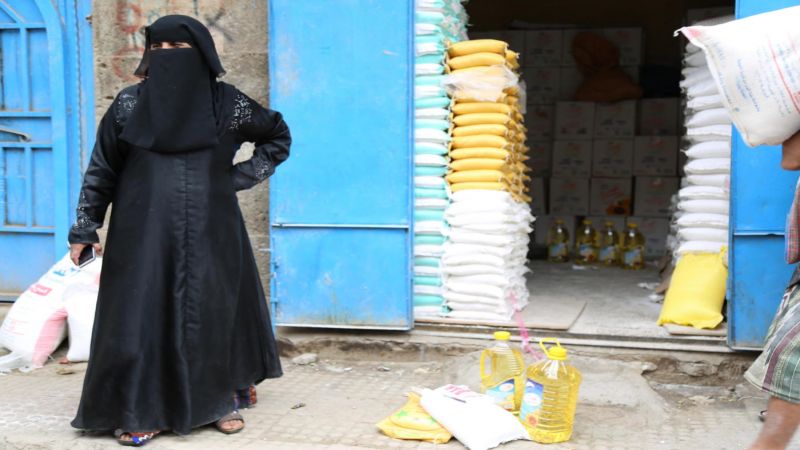
By Nasser Abdulkareem
“During the last two months our suffering has been aggravated and many times I could not find food for my children,” says Juma’a Saleh, a mother of eight from Yemen’s capital city Sana’a. Juma’a is one of many residents celebrating the resumption of food distribution in the city, following a deal between the World Food Program (WFP) and the authorities earlier this month.
The Norwegian Refugee Council (NRC) had been supporting people in war-stricken Sana’a with monthly food baskets consisting of flour, beans, cooking oil, sugar and salt, funded by WFP.
However, in June 2019, there was a disagreement between WFP and the authorities over the necessary conditions needed for the delivery of food aid. This led to WFP temporarily suspending food aid in Sana’a, and NRC was forced to stop its WFP-funded distributions.
Juma’a’s story
Juma’a is in her 40s and lives in a small house in Sana’a with her family. She has been struggling to eke out a decent living for her children since 2010 when her husband died after suffering from paralysis.
Before 2015, Juma’a used to receive money from the government’s social welfare system, as well as some donations from generous people in her community. However, when the war broke out in Yemen both sources of income dried up and her eight children had to drop out of school because she couldn’t afford to pay their school fees.
“I have very few resources and lack an income so I was forced to stop my children’s studies as I could not prioritize their education amid these bad conditions,” Juma’a explains. “Getting enough food, paying the rent and buying the medicines we need are the priorities for the family nowadays.”
Medical bills add to the burden
Juma’a suffers from diabetes and needs medication to treat her condition. One of her daughters also suffers from a bladder and kidney disease and needs USD 50 per month to pay for her medicine – a sum that she can barely afford.
“Sometimes generous people help me with the costs for medicines but most of the time it is difficult to find the money from anywhere, so one of my daughters has resorted to working as a cleaner in a school to help us pay the rent,” Juma’a explains.
“NRC has played an important role in assisting my family over the last few years by providing us with food on a monthly basis. Getting enough food was not a problem as we received food aid, and any other income we managed to raise we used to cover other basic needs like medicines and water.”
A two-month struggle for survival
The suspension of food aid in June 2019 meant that Juma’a had to take some difficult decisions.
“During the last two months our suffering has been aggravated and many times I could not find food for my children,” she says. “I borrowed money from my neighbors but could not pay it back until now.”
“We had to prioritize buying food over spending money on medicines, so my daughter could not have medicine for her bladder and kidney condition.”
Thankfully, relief was at hand. Following a welcome agreement between WFP and the authorities, NRC resumed food distributions in Sana’a on 2 September 2019.
Juma’a recalls: “It was Eid day for us when our neighbors told us food distributions would resume. I felt happy to be receiving food baskets again.”
Source: NRC, Edited by Website Team